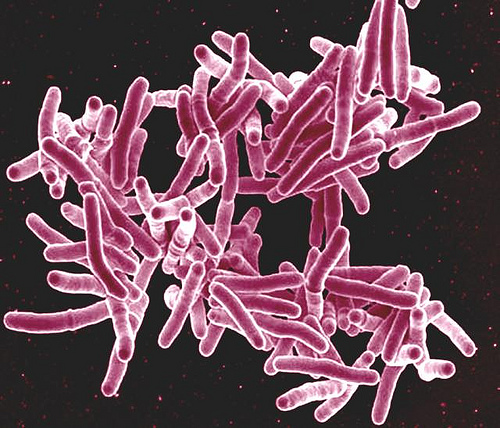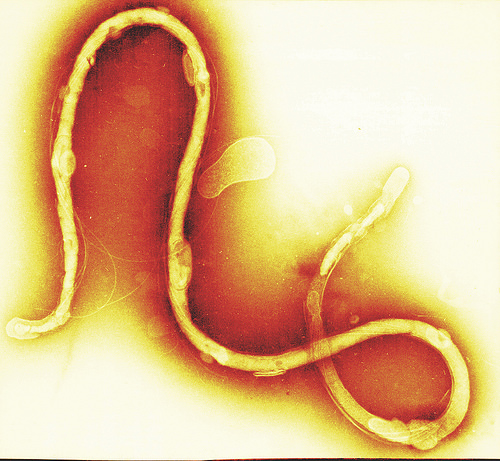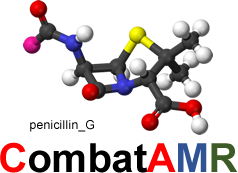Antibiotics are the medicines used to prevent and treat bacterial infections. Antibiotic resistance occurs when bacteria change in response to the use of these medicines. Bacteria, not animals or humans, become antibiotic-resistant. These bacteria may infect animals and humans, and the infections they cause are harder to treat than those caused by non-resistant bacteria

The greatest possibility of evil in self-medication [with penicillin] is the use of too-small doses, so that, instead of clearing up the infection, the microbes are educated to resist penicillin and a host of penicillin-fast organisms is bred out which can be passed on to other individuals and perhaps from there to others until they reach someone who gets a septicemia or a pneumonia which penicillin cannot save.
In such a case the thoughtless person playing with penicillin treatment is morally responsible for the death of the man who finally succumbs to infection with the penicillin-resistant organism. I hope this evil can be averted.
Sir Alexander Fleming.
In 'Penicillin’s Finder Assays Its Future: Sir Alexander Fleming Says
Improved Dosage Method is Needed to Extend Use', New York Times (26 June 1945)
- Antibiotic resistance is now one of the three greatest threats to human health.
- In the European Union alone there are over 33,000 patient deaths a year due to drug resistant infections.
- Antimicrobial resistance (AMR) occurs when bacteria change in response to the use of antibiotic medicines. Bacteria, not animals or humans, become antibiotic-resistant. These bacteria may infect animals and humans, and the infections they cause are harder to treat than those caused by non-resistant bacteria.
- AMR is a natural process that has existed long before modern antibiotics. Traces of antibiotic-resistant bacteria have even be found in ancient Egyptian tombs.
- 40% of all Europeans wrongly believe that antibiotics work against colds and flu.
- More than 440000 new instances of multidrug-safe tuberculosis (MDR-TB) were accounted for by WHO in the year 2013 in hundred nations around the world. (NB: Now approaching 500,000, 2018)
- Healthcare worker hand hygiene is only at 40% worldwide
- By 1955, 13% of common Staphylococcus aureus infections were resistant to penicillin, and by 1988 this percentage was up to 91%. Today, penicillin is no longer recommended as the first line of treatment of Staphylococcus infections because it is effective in less than 10% of new cases.
- It is estimated that nearly 50 per cent of all antimicrobial use in hospitals is unnecessary or inappropriate
source: Combating Antimicrobial Resistance: Policy Recommendations to Save Lives, Clinical Infectious Diseases, IDSA, 2011

- An untreatable form of gonorrhea is spreading across the world and has been detected in the UK and the Neisseria gonorrhoea bacteria is showing high resistance to azithromycin.
An estimated 78 million people globally are infected with gonorrhea each year.
Read latest report 30.08.18: Gonococcal antimicrobial susceptibility surveillance in Europe (Euro-GASP).
https://ecdc.europa.eu/en/publications-data/gonococcal-antimicrobial-susceptibility-surveillance-europe-2016 - Before the introduction of antibiotics, 40 percent of deaths in the UK were caused by infection: today, the figure is closer to 7 per cent but is in danger of increasing if the efficacy of antibiotics is lost .
source: Figure given by Chief Medical Officer in presentation to The Parliamentary and Scientific Committee on 11 June 2013 at the House of Parliament, London, UK. - On any given day, about 80,000 patients have at least one healthcare-associated infection, i.e. one in 18 patients in a European hospital. source: ECDC 2011 - 2012 point prevalence survey
- In Europe 7% of all antibiotics used in 2016 were taken without prescription; the two main sources being over-the-counter (OTC) sales and use of leftover antibiotics. source: Final report of the EU-funded ARNA project “Antimicrobial Resistance and causes of Non-prudent use of Antibiotics”
- There are 44,000 deaths from sepsis every year in the UK and deaths due to antibiotic resistance are an increasing proportion. Globally there are well over 6 million deaths due to sepsis "every 4 seconds someone dies of sepsis" source: Dr Rob Daniels, CEO Sepsis Trust.
- In the UK approximately 16000 a year die of sepsis due to drug-resistant infections
- Globally, an estimated 214,000 annual neonatal deaths are due to septic infections caused by antibiotic resistant pathogens. source: Laxminarayan, R. et al. Access to effective antimicrobials: a worldwide challenge. Lancet 387, 168–175 (2016).
- Antibiotics are now failing to work in a fifth of patients who suffer an infection after hospital surgery. source Peter Jackson AMR Centre

Comments from Chief Medical Officer UK, Dame Sally Davies:-
- Around 700,000 people around the world die annually due to drug-resistant infections. If no action is taken, it has been estimated that drug-resistant infections will kill 10 million people a year by 2050.
- “We really are facing, if we don’t take action now, a dreadful post-antibiotic apocalypse,”
- “I don’t want to say to my children that I didn’t do my best to protect them and their children.”
- AMR is with us now, killing people. “This is a serious issue that is with us now, causing deaths “If it was anything else people would be up in arms about it. But because it is hidden they just let it pass.
- “It (AMR) does not really have a ‘face’ because most people who die of drug resistant infections, their families just think they died of an uncontrolled infection. “It will only get worse unless we take strong action everywhere across the globe.
- “We need some real work on the ground to make a difference or we risk the end of modern medicine.”

- “The UK is not content to sit back and let this turn into a catastrophe. “Part of the problem has been a lack of coordination of global efforts and an understanding of where we need to target our future efforts.
Alistair Burt, Foreign and International Development Minister - “The Global Burden of Disease AMR project will provide vital information on the spread and impact of drug resistance. “The partnership - part of more than £160m in new research funding in the past year – will help us to pinpoint problem areas. “This is just one part of our more than £615m investment by the UK Government into tackling drug-resistant infections since we launched our National Strategy at the end of 2013.” The project which will map the spread of superbugs is a collaboration between the UK Government, Wellcome Trust, Bill and Melinda Gates Foundation, the University of Oxford and the Institute of Health Metrics and Evaluation.
Alistair Burt, Foreign and International Development Minister. - “While we have seen progress in recognition around the world of the threat that superbugs pose, we need to retain momentum. High-level commitments must quickly become action.
Tim Jinks, head of drug resistant infections, Wellcome Trust, - Less than two-thirds of hospitals providing surgical care in 19 LMICs had a reliable water source.
Source: 2016 Elsevier Inc. Pub. Journal of Surgical Research September 2016 (205) p. 169-178 - Three of the drug-resistant threats identified in the US – primarily campylobacter and salmonella – can originate in animals
- 70 percent of emerging diseases can infect both humans and animals.
- 151 of 195 countries are developing a plan, just one in five commit to reducing antibiotic use, improving hygiene and preserving antibiotics of last resort.
source: The UN Foundation and the Wellcome Trust analysis on global action plans to tackle superbugs. - Only 5% of AMR Country Plans are adequately funded and monitored.
source: Wellcome Fdn. - 60,000 babies die each year in India due to drug-resistant infections. Academy of Medical Sciences has pledged to build stronger research links between the UK and India – supported by The Yusuf and Farida Hamied Foundation. The programme will include a visiting professor scheme and two major scientific meetings.
source: Press Association.

- "If we fail to act, we are looking at an almost unthinkable scenario where antibiotics no longer work and we are cast back into the dark ages of medicine"
David Cameron, former UK Prime Minister. - “If we don’t act now, our medicine cabinet will be empty and we won’t have the antibiotics we need to save lives.”
CDC Director, Tom Frieden, M.D., M.P.H. - Animal research leads to breakthroughs in human health: Research into Bovine Papilloma Virus eventually led to development of a human HPV (human papilloma virus) vaccine, which is now administered to countless children worldwide and protects against cervical cancer.
- Protecting animals protects people: Just 13 zoonoses, diseases which can be transferred from animals to people and vice-versa, are responsible for 2.4 billion cases of human illness and 2.2 million deaths per year.
- Stopping zoonoses in animals safeguards our health. Zoonotics are growing: 3/4ths of new, emerging diseases come from animals, however, most are from wildlife. Improved monitoring and management of wildlife can help researchers better anticipate transmission before it occurs.
- Antibiotics exist to fight disease: 20% of livestock animals are lost to disease each year .
- AMR requires One Health solutions to deal with this challenge: A research team from University of Edinburgh recently tested a theory: "What would happen if we simply reduced antibiotics in animals, but not in people, to address AMR?" Their results: "curtailing the volume of antibiotics consumed by food animals has, as a stand-alone measure, little impact on the level of resistance in humans." Their findings show why One Health must be at the center of AMR solutions.
- Animals are fed with antibiotics to grow faster which cross-contaminates into the human world

